外研版七年级英语上册 Module 4 Unit 3 Language in use. 课件 (共38张PPT)
文档属性
| 名称 | 外研版七年级英语上册 Module 4 Unit 3 Language in use. 课件 (共38张PPT) |

|
|
| 格式 | ppt | ||
| 文件大小 | 1.5MB | ||
| 资源类型 | 教案 | ||
| 版本资源 | 外研版 | ||
| 科目 | 英语 | ||
| 更新时间 | 2022-07-26 00:00:00 | ||
图片预览


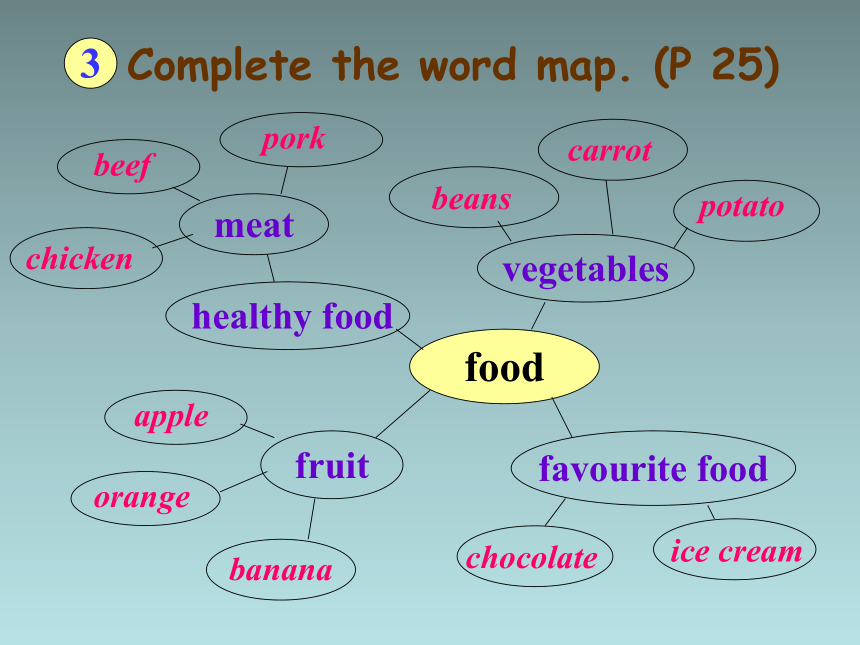

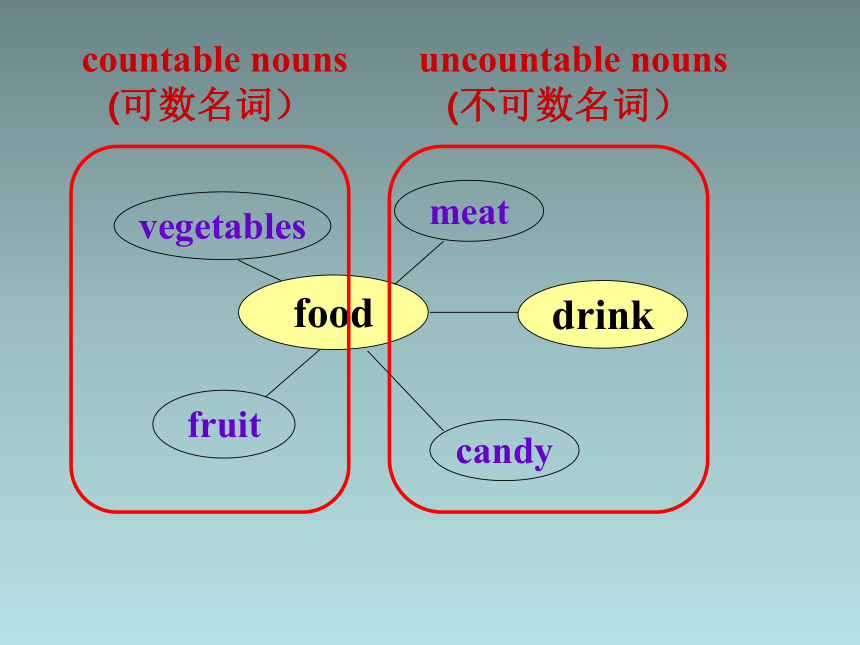
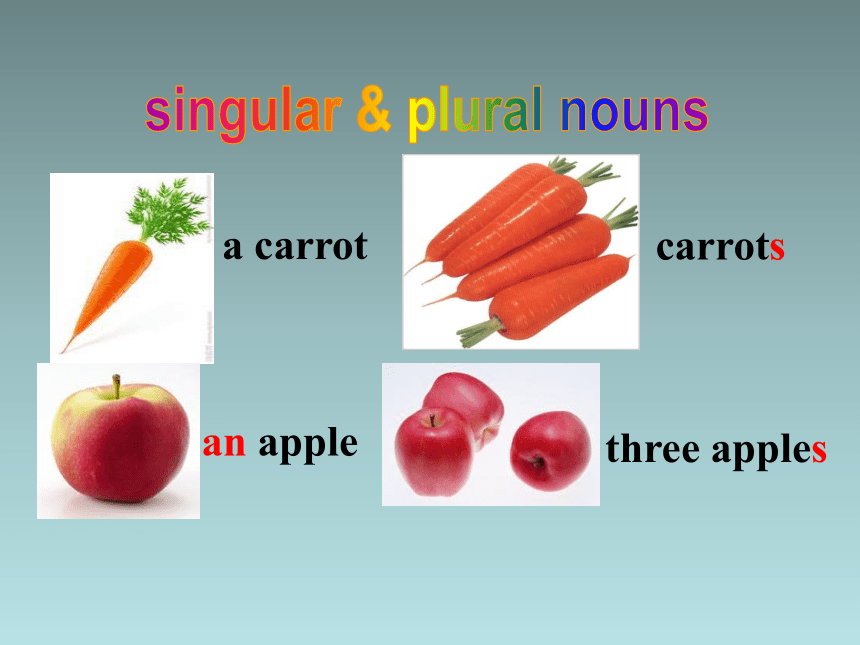
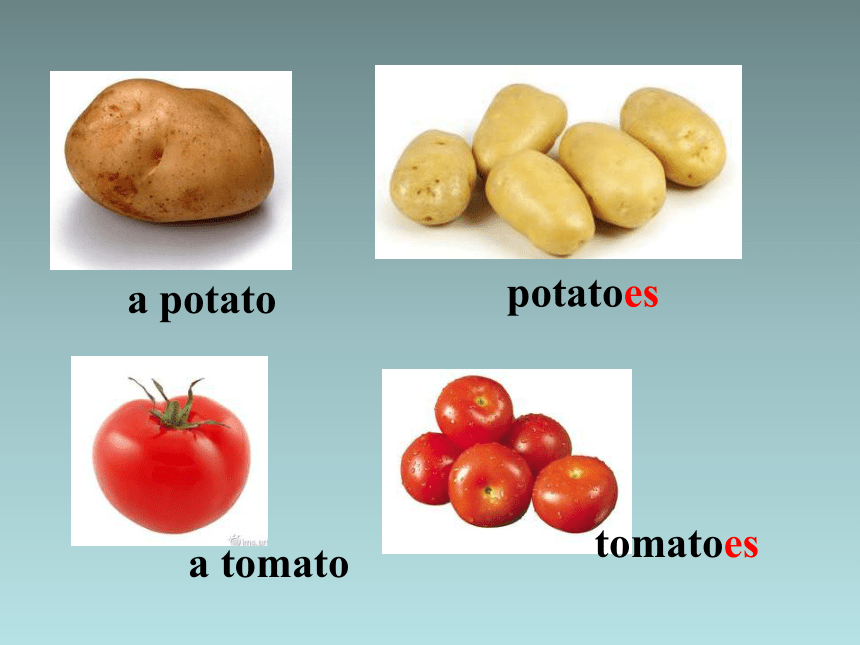
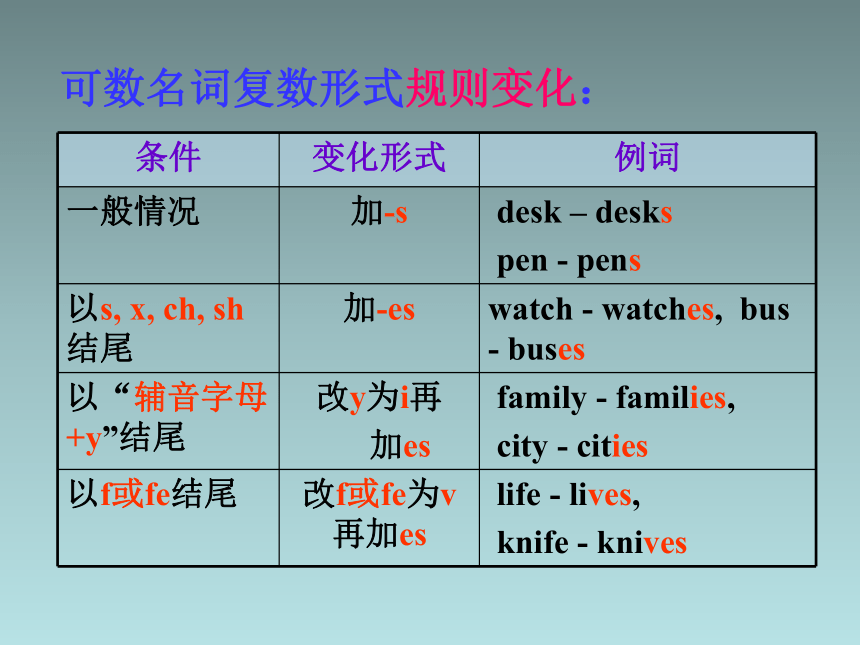
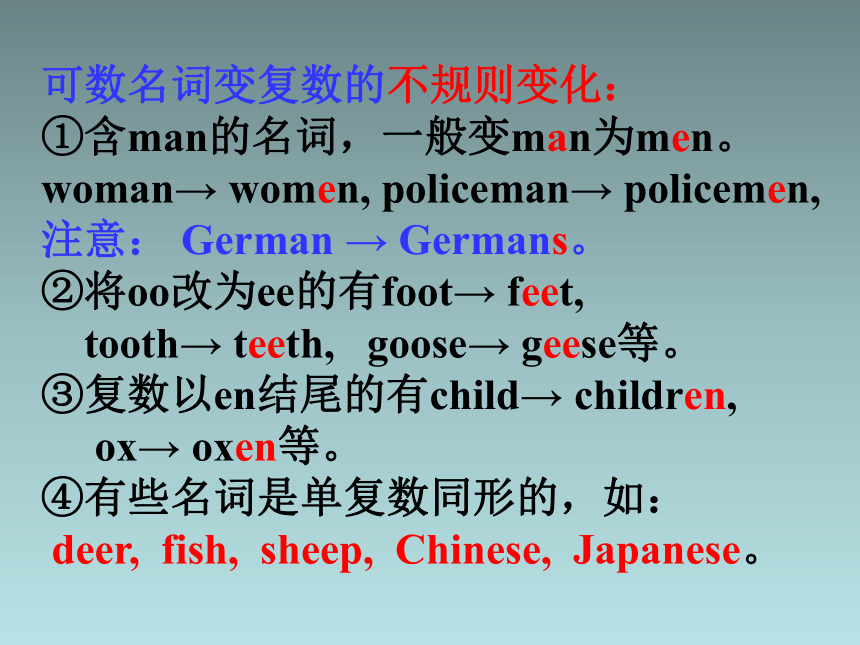
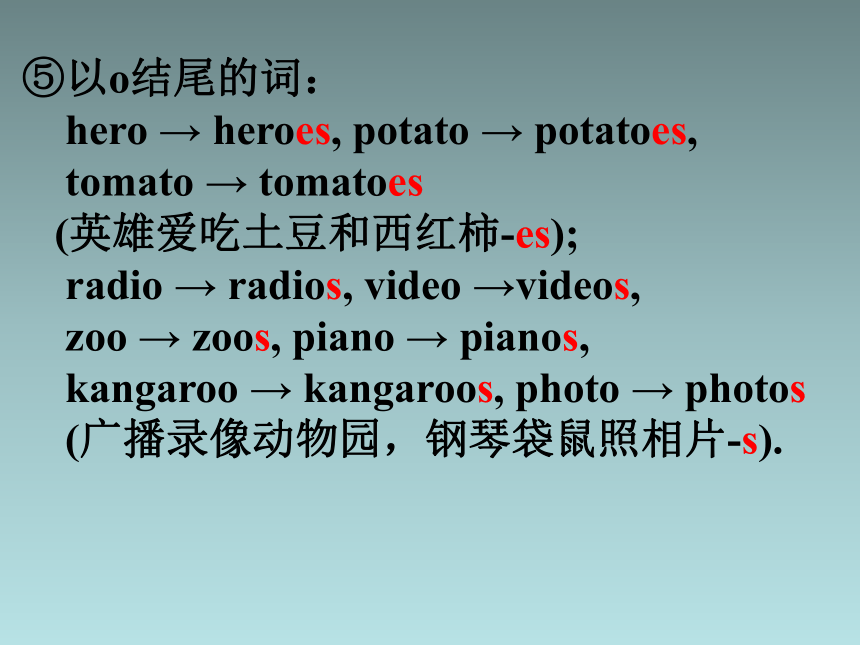
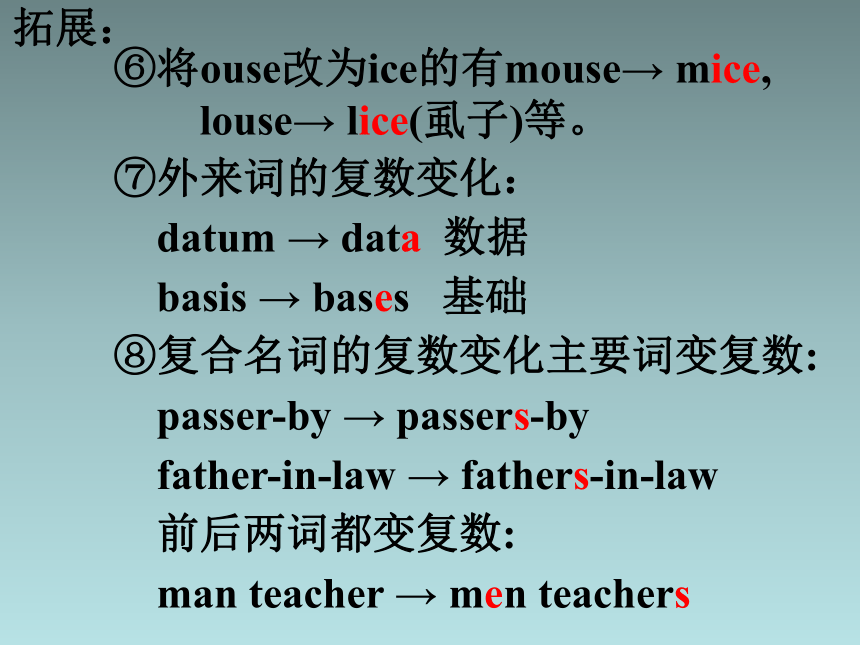
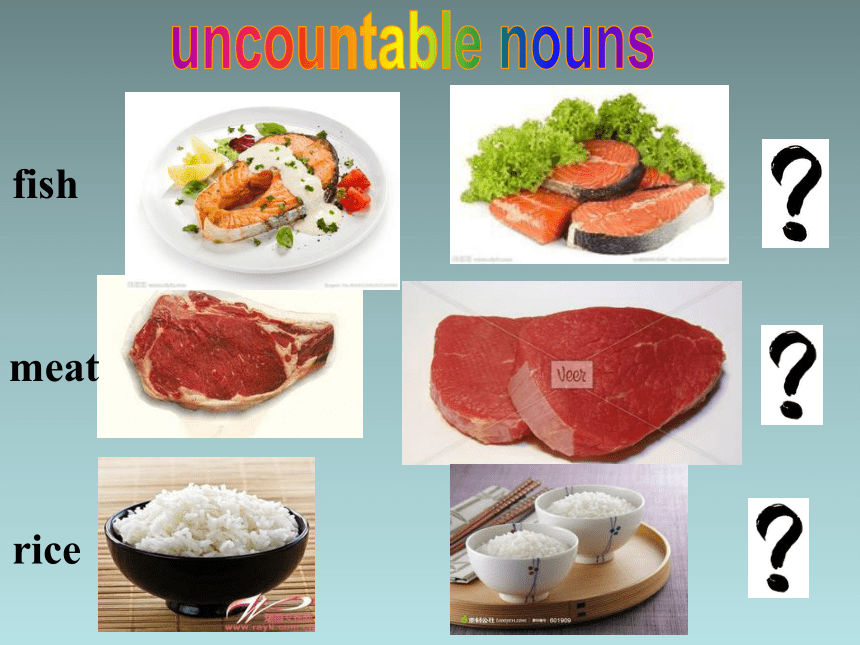
文档简介
(共38张PPT)
Module 4
Healthy food
What’s your favourite food
What’s your favourite drink
Is it healthy food and drink
Complete the word map. (P 25)
food
vegetables
favourite food
healthy food
meat
fruit
chocolate
ice cream
apple
orange
banana
beans
carrot
potato
pork
beef
chicken
3
drink
healthy drink
favourite drink
juice
milk
water
tea
cola
food
drink
vegetables
fruit
meat
countable nouns
(可数名词)
uncountable nouns
(不可数名词)
candy
a carrot
carrots
an apple
three apples
a potato
potatoes
a tomato
tomatoes
可数名词复数形式规则变化:
条件 变化形式 例词
一般情况 加-s desk – desks
pen - pens
以s, x, ch, sh结尾 加-es watch - watches, bus - buses
以“辅音字母+y”结尾 改y为i再
加es family - families,
city - cities
以f或fe结尾 改f或fe为v再加es life - lives,
knife - knives
可数名词变复数的不规则变化:
①含man的名词,一般变man为men。
woman→ women, policeman→ policemen,
注意: German → Germans。
②将oo改为ee的有foot→ feet,
tooth→ teeth, goose→ geese等。
③复数以en结尾的有child→ children,
ox→ oxen等。
④有些名词是单复数同形的,如:
deer, fish, sheep, Chinese, Japanese。
⑤以o结尾的词:
hero → heroes, potato → potatoes,
tomato → tomatoes
(英雄爱吃土豆和西红柿-es);
radio → radios, video →videos,
zoo → zoos, piano → pianos,
kangaroo → kangaroos, photo → photos
(广播录像动物园,钢琴袋鼠照相片-s).
⑥将ouse改为ice的有mouse→ mice,
louse→ lice(虱子)等。
⑦外来词的复数变化:
datum → data 数据
basis → bases 基础
⑧复合名词的复数变化主要词变复数:
passer-by → passers-by
father-in-law → fathers-in-law
前后两词都变复数:
man teacher → men teachers
拓展:
fish
meat
rice
不可数名词前面不能用定冠词a/an,也没有复数形式。它的“量”经常由可数名词来帮助表达,常用结构为:
表示数量的词 + 量词 + of + 不可数名词。
拓展:不可数名词“量”的表达
three pieces of fish
two pieces of meat
two bowls of rice
1. 确切数量的表达方式:
当表示“一杯/袋……”时,单位词要用
单数形式,如: a glass of water。
当表示“两杯/袋……”时,单位词要用
复数形式,如: two glasses of water。
2. 不确切数量的表达方式:
当表示大概,不确定的数量时,可运用
下列单词或短语:
① some, any, plenty of, a lot of, lots of等
(既可修饰不可数名词也可修饰可数名词)。
Please give me some paper.
② much, a great deal of, a bit of, a drop of,
a piece of, a little等(只可修饰不可数名词)。
I want a piece of chalk.
Please give me a little ink.
1. We haven’t got any _______ (桔子).
2. Eating more __________ (蔬菜) is
good for your health.
3. How many ________ (西红柿) have
you got
4. My favourite meat is ____ (鱼肉).
根据括号内的汉语提示完成句子。
oranges
vegetables
tomatoes
fish
have/has got…
1. We’ve got lots of apples.
2. We haven’t got any oranges.
3. We haven’t got any meat.
4. She hasn’t got any coffee.
5. — Have we got any chocolate
— Yes, we have.
6. I haven’t got any cola.
肯定句: 主语 + have/has got + …
否定句: 主语 + haven’t/hasn’t got + …
have/has got的用法
Yes, 主语 + have/has.
No, 主语 + haven’t/hasn’t.
have/has got表示“有”的意思。have/ has 是助动词,其构成形式为:
一般疑问句: Have/Has + 主语 + got + …
特殊疑问句: 疑问词 + 一般疑问句
注: have用于主语是第一人称(I, we),第二人称(you)以及第三人称复数(they),其他复数名词或并列的主语。
has 用于第三人称单数(he, she, it或单数名词)。
eg: I have got a new pen.
Have you got a new pen
He has got a friend.
She hasn’t got a friend.
They have got many friends.
1. We_____ ____ (get) lots of apples.
2. We _______ ____ (not get) any oranges.
3. We _______ _____ (not get) any meat.
4. She ______ ____ (not get) any coffee.
5. —_____ we ____ (get) any chocolate
—Yes, we _____.
6. I _______ ____ (not get) any cola.
have got
haven’t got
hasn’t got
Have got
have
haven’t got
Ready
haven’t got
在上一模块我们学习了There be句型。There be 和 have / has got 都表示“有”。
它们的区别是什么呢?
考考你
含义 关系
have/has got 某人有 所属关系
there be 某地有某人或某物 存在关系
I have got a new book.
There is a new book on the desk.
She has got a lot of friends.
There are a lot of friends in the meeting room.
我有一本新书。
桌子上有一本新书。
她有很多朋友。
会议室里有很多朋友。
1) We haven’t got any yogurt in the fridge.
我们冰箱里没有酸奶了。
2) There isn’t any yogurt in the fridge.
冰箱里没有酸奶了。
两句都表示冰箱里没有酸奶,但第一句强调“我们没有酸奶了”,冰箱是次要的;而第二句强调“冰箱里没有酸奶了”,至于其他地方有没有,就无从知晓了。
有时have got与there be句型表达的意思很近,但句型和侧重点还是不同。如:
1. ___ _____ any bread in the box
2. She ____ ____ a nice kite.
3. Under the tree _____ _____ some
women drinking tea.
4. _____ _____ any cakes in your bag
5. ______ you ____ a white shirt
Is there
has got
there are
Are there
Have got
用 there be / have (has) got 的正确形式填空。
some & any
1. We haven’t got any oranges.
2. We haven’t got any meat.
3. She hasn’t got any coffee.
4. — Have we got any chocolate
— Yes, we have.
5. Let’s get some chicken.
6. I haven’t got any cola.
7. There are lots of fruit and vegetables for lunch
at school, but there isn’t any cola or candy.
8. Some coffee for Mum and some cola for me.
some用于肯定句中
any 用于疑问句和否定句中
some和any既可用于可数名词的复数之前,也可用于不可数名词之前。
Could I have some more bread, please
我多拿一些面包可以吗?
Would you like some more soup
你还要点汤吗?
注意:当说话人期待肯定回答或者有意图鼓励说话人作肯定回答时,some可用于疑问句。
some & any
1. We haven’t got ____ (some/ any) oranges.
2. We haven’t got ____ (some/ any) meat.
3. She hasn’t got ____ (some/any) coffee.
4. —Have we got ____ (some/ any)
chocolate
—Yes, we have.
5. Let’s get ______(some/any) chicken.
6. I haven’t got ____ (some/any) cola.
7. There are lots of fruit and vegetables for lunch
at school, but there isn’t ____ (some/any) cola
or candy.
8. ______ (some/any) coffee for Mum and _____
(some/any) cola for me.
any
any
any
any
some
any
any
Some
some
Ready
1
Work in pairs. Look at the picture and talk about the food in the fridge. (P 24)
— Have we got any…
— Yes, we have./
No, we haven’t.
Now write about the food in the fridge.
We’ve got some meat.
We haven’t got any fish.
__________________ vegetables.
2. _________________ oranges.
3. _________________ apples.
4. _________________ eggs.
5. _________________ bananas.
6. _________________ orange juice.
7. _________________ milk.
We’ve got some
We haven’t got any
We haven’t got any
We’ve got some
We’ve got some
We’ve got some
We haven’t got any
apple hamburger orange potato tomato
apples hamburgers oranges potatoes tomatoes
fish meat rice milk juice chicken water
Look at the words in the box and pay attention to the plural nouns. (P 24)
2
Look at the picture and talk about it.
He has got some /a(n)…
He hasn’t got any…
She has got some /a(n)…
She hasn’t got any…
They have got some /a(n)…
They haven’t got any…
He has got some chicken/ fish/ meat/ rice/ potatoes/ water.
He hasn’t got any juice/ oranges/ apples/ milk/ hamburgers.
She has got some juice/ oranges/ apples/ milk/ a hamburger.
She hasn’t got any potatoes/ chicken/ fish/ meat/ rice/ noodles.
They have got some food and drinks.
They haven’t got any noodles.
Possible answers:
4
Complete the sentences with the correct form of the words from the box. (P 25)
bit delicious important remember stay
1. _________ to buy some fruit.
2. It’s _________ to eat healthy food.
3. Eat well and _____ healthy.
4. Orange juice is ________. Let’s buy some.
5. I am a ____ tired.
Remember
important
stay
delicious
bit
Making a poster about a healthy breakfast.
Ⅰ. Work in groups of four or five. Make a poster about a healthy breakfast.
Make a list of questions about a healthy breakfast.
Talk to students from another group about a healthy breakfast.
Make a poster about your healthy breakfast.
Ⅱ. Present your poster to the class.
Ⅲ. Choose the best poster.
1. has/have got表示“某人有某物”
肯定句: 主语 + have/has got + …
否定句: 主语 + haven’t/hasn’t got + …
Yes, 主语 + have/has.
No, 主语 + haven’t/hasn’t.
一般疑问句: Have/Has + 主语 + got + …
2. some和any的用法
3. 可数名词的复数变化及不可数名词
Module 4
Healthy food
What’s your favourite food
What’s your favourite drink
Is it healthy food and drink
Complete the word map. (P 25)
food
vegetables
favourite food
healthy food
meat
fruit
chocolate
ice cream
apple
orange
banana
beans
carrot
potato
pork
beef
chicken
3
drink
healthy drink
favourite drink
juice
milk
water
tea
cola
food
drink
vegetables
fruit
meat
countable nouns
(可数名词)
uncountable nouns
(不可数名词)
candy
a carrot
carrots
an apple
three apples
a potato
potatoes
a tomato
tomatoes
可数名词复数形式规则变化:
条件 变化形式 例词
一般情况 加-s desk – desks
pen - pens
以s, x, ch, sh结尾 加-es watch - watches, bus - buses
以“辅音字母+y”结尾 改y为i再
加es family - families,
city - cities
以f或fe结尾 改f或fe为v再加es life - lives,
knife - knives
可数名词变复数的不规则变化:
①含man的名词,一般变man为men。
woman→ women, policeman→ policemen,
注意: German → Germans。
②将oo改为ee的有foot→ feet,
tooth→ teeth, goose→ geese等。
③复数以en结尾的有child→ children,
ox→ oxen等。
④有些名词是单复数同形的,如:
deer, fish, sheep, Chinese, Japanese。
⑤以o结尾的词:
hero → heroes, potato → potatoes,
tomato → tomatoes
(英雄爱吃土豆和西红柿-es);
radio → radios, video →videos,
zoo → zoos, piano → pianos,
kangaroo → kangaroos, photo → photos
(广播录像动物园,钢琴袋鼠照相片-s).
⑥将ouse改为ice的有mouse→ mice,
louse→ lice(虱子)等。
⑦外来词的复数变化:
datum → data 数据
basis → bases 基础
⑧复合名词的复数变化主要词变复数:
passer-by → passers-by
father-in-law → fathers-in-law
前后两词都变复数:
man teacher → men teachers
拓展:
fish
meat
rice
不可数名词前面不能用定冠词a/an,也没有复数形式。它的“量”经常由可数名词来帮助表达,常用结构为:
表示数量的词 + 量词 + of + 不可数名词。
拓展:不可数名词“量”的表达
three pieces of fish
two pieces of meat
two bowls of rice
1. 确切数量的表达方式:
当表示“一杯/袋……”时,单位词要用
单数形式,如: a glass of water。
当表示“两杯/袋……”时,单位词要用
复数形式,如: two glasses of water。
2. 不确切数量的表达方式:
当表示大概,不确定的数量时,可运用
下列单词或短语:
① some, any, plenty of, a lot of, lots of等
(既可修饰不可数名词也可修饰可数名词)。
Please give me some paper.
② much, a great deal of, a bit of, a drop of,
a piece of, a little等(只可修饰不可数名词)。
I want a piece of chalk.
Please give me a little ink.
1. We haven’t got any _______ (桔子).
2. Eating more __________ (蔬菜) is
good for your health.
3. How many ________ (西红柿) have
you got
4. My favourite meat is ____ (鱼肉).
根据括号内的汉语提示完成句子。
oranges
vegetables
tomatoes
fish
have/has got…
1. We’ve got lots of apples.
2. We haven’t got any oranges.
3. We haven’t got any meat.
4. She hasn’t got any coffee.
5. — Have we got any chocolate
— Yes, we have.
6. I haven’t got any cola.
肯定句: 主语 + have/has got + …
否定句: 主语 + haven’t/hasn’t got + …
have/has got的用法
Yes, 主语 + have/has.
No, 主语 + haven’t/hasn’t.
have/has got表示“有”的意思。have/ has 是助动词,其构成形式为:
一般疑问句: Have/Has + 主语 + got + …
特殊疑问句: 疑问词 + 一般疑问句
注: have用于主语是第一人称(I, we),第二人称(you)以及第三人称复数(they),其他复数名词或并列的主语。
has 用于第三人称单数(he, she, it或单数名词)。
eg: I have got a new pen.
Have you got a new pen
He has got a friend.
She hasn’t got a friend.
They have got many friends.
1. We_____ ____ (get) lots of apples.
2. We _______ ____ (not get) any oranges.
3. We _______ _____ (not get) any meat.
4. She ______ ____ (not get) any coffee.
5. —_____ we ____ (get) any chocolate
—Yes, we _____.
6. I _______ ____ (not get) any cola.
have got
haven’t got
hasn’t got
Have got
have
haven’t got
Ready
haven’t got
在上一模块我们学习了There be句型。There be 和 have / has got 都表示“有”。
它们的区别是什么呢?
考考你
含义 关系
have/has got 某人有 所属关系
there be 某地有某人或某物 存在关系
I have got a new book.
There is a new book on the desk.
She has got a lot of friends.
There are a lot of friends in the meeting room.
我有一本新书。
桌子上有一本新书。
她有很多朋友。
会议室里有很多朋友。
1) We haven’t got any yogurt in the fridge.
我们冰箱里没有酸奶了。
2) There isn’t any yogurt in the fridge.
冰箱里没有酸奶了。
两句都表示冰箱里没有酸奶,但第一句强调“我们没有酸奶了”,冰箱是次要的;而第二句强调“冰箱里没有酸奶了”,至于其他地方有没有,就无从知晓了。
有时have got与there be句型表达的意思很近,但句型和侧重点还是不同。如:
1. ___ _____ any bread in the box
2. She ____ ____ a nice kite.
3. Under the tree _____ _____ some
women drinking tea.
4. _____ _____ any cakes in your bag
5. ______ you ____ a white shirt
Is there
has got
there are
Are there
Have got
用 there be / have (has) got 的正确形式填空。
some & any
1. We haven’t got any oranges.
2. We haven’t got any meat.
3. She hasn’t got any coffee.
4. — Have we got any chocolate
— Yes, we have.
5. Let’s get some chicken.
6. I haven’t got any cola.
7. There are lots of fruit and vegetables for lunch
at school, but there isn’t any cola or candy.
8. Some coffee for Mum and some cola for me.
some用于肯定句中
any 用于疑问句和否定句中
some和any既可用于可数名词的复数之前,也可用于不可数名词之前。
Could I have some more bread, please
我多拿一些面包可以吗?
Would you like some more soup
你还要点汤吗?
注意:当说话人期待肯定回答或者有意图鼓励说话人作肯定回答时,some可用于疑问句。
some & any
1. We haven’t got ____ (some/ any) oranges.
2. We haven’t got ____ (some/ any) meat.
3. She hasn’t got ____ (some/any) coffee.
4. —Have we got ____ (some/ any)
chocolate
—Yes, we have.
5. Let’s get ______(some/any) chicken.
6. I haven’t got ____ (some/any) cola.
7. There are lots of fruit and vegetables for lunch
at school, but there isn’t ____ (some/any) cola
or candy.
8. ______ (some/any) coffee for Mum and _____
(some/any) cola for me.
any
any
any
any
some
any
any
Some
some
Ready
1
Work in pairs. Look at the picture and talk about the food in the fridge. (P 24)
— Have we got any…
— Yes, we have./
No, we haven’t.
Now write about the food in the fridge.
We’ve got some meat.
We haven’t got any fish.
__________________ vegetables.
2. _________________ oranges.
3. _________________ apples.
4. _________________ eggs.
5. _________________ bananas.
6. _________________ orange juice.
7. _________________ milk.
We’ve got some
We haven’t got any
We haven’t got any
We’ve got some
We’ve got some
We’ve got some
We haven’t got any
apple hamburger orange potato tomato
apples hamburgers oranges potatoes tomatoes
fish meat rice milk juice chicken water
Look at the words in the box and pay attention to the plural nouns. (P 24)
2
Look at the picture and talk about it.
He has got some /a(n)…
He hasn’t got any…
She has got some /a(n)…
She hasn’t got any…
They have got some /a(n)…
They haven’t got any…
He has got some chicken/ fish/ meat/ rice/ potatoes/ water.
He hasn’t got any juice/ oranges/ apples/ milk/ hamburgers.
She has got some juice/ oranges/ apples/ milk/ a hamburger.
She hasn’t got any potatoes/ chicken/ fish/ meat/ rice/ noodles.
They have got some food and drinks.
They haven’t got any noodles.
Possible answers:
4
Complete the sentences with the correct form of the words from the box. (P 25)
bit delicious important remember stay
1. _________ to buy some fruit.
2. It’s _________ to eat healthy food.
3. Eat well and _____ healthy.
4. Orange juice is ________. Let’s buy some.
5. I am a ____ tired.
Remember
important
stay
delicious
bit
Making a poster about a healthy breakfast.
Ⅰ. Work in groups of four or five. Make a poster about a healthy breakfast.
Make a list of questions about a healthy breakfast.
Talk to students from another group about a healthy breakfast.
Make a poster about your healthy breakfast.
Ⅱ. Present your poster to the class.
Ⅲ. Choose the best poster.
1. has/have got表示“某人有某物”
肯定句: 主语 + have/has got + …
否定句: 主语 + haven’t/hasn’t got + …
Yes, 主语 + have/has.
No, 主语 + haven’t/hasn’t.
一般疑问句: Have/Has + 主语 + got + …
2. some和any的用法
3. 可数名词的复数变化及不可数名词
同课章节目录
- Starte
- Module 1 My teacher and my friends
- Module 2 My English lesson
- Module 3 My English book
- Module 4 My everyday life
- Module 1 My classmates
- Unit 1 Nice to meet you.
- Unit 2 I'm Wang Lingling and I'm thirteen years ol
- Unit 3 Language in use.
- Module 2 My family
- Unit 1 Is this your mum?
- Unit 2 These are my parents.
- Unit 3 Language in use.
- Module 3 My school
- Unit 1 There are thirty students in my class.
- Unit 2 The library is on the left of the playgroun
- Unit 3 Language in use.
- Module 4 Healthy food
- Unit 1 We've got lots of apples.
- Unit 2 Is your food and drink healthy?
- Unit 3 Language in use.
- Module 5 My school day
- Unit 1 I love history.
- Unit 2 We start work at nine o'clock.
- Unit 3 Language in use.
- Revision module A
- Module 6 A trip to the zoo
- Unit 1 Does it eat meat?
- Unit 2 The tiger lives in Asia.
- Unit 3 Language in use.
- Module 7 Computers
- Unit 1 How do I write my homework on the computer?
- Unit 2 When do you use a computer?
- Unit 3 Language in use.
- Module 8 Choosing presents
- Unit 1 I always like birthday parties.
- Unit 2 She often goes to concerts.
- Unit 3 Language in use.
- Module 9 People and places
- Unit 1 We're enjoying the school trip a lot.
- Unit 2 They're waiting for buses or trains.
- Unit 3 Language in use.
- Module 10 Spring Festival
- Unit 1 Are you getting ready for Spring Festival?
- Unit 2 My mother's cleaning our houses and sweepin
- Unit 3 Language in use.
- Revision module B
